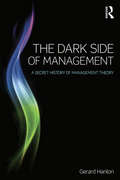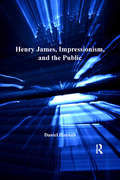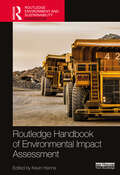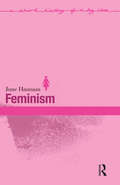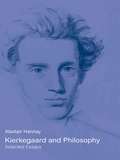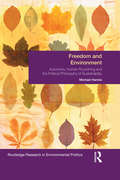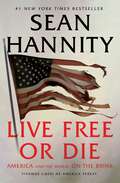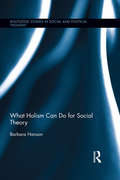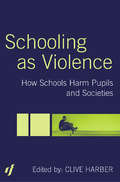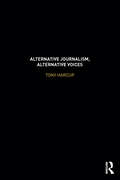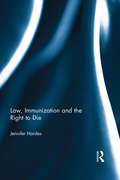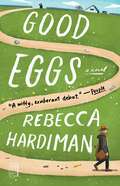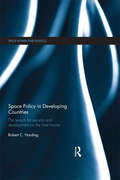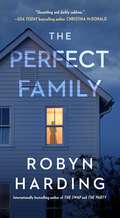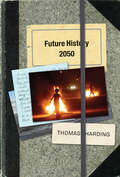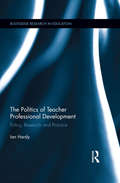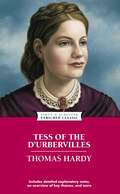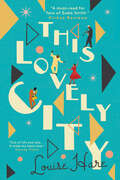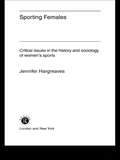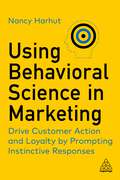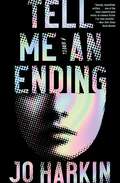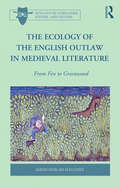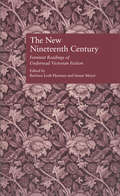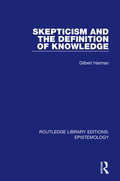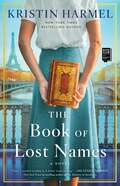Special Collections
Benetech’s Global Certified Accessible Titles
Description: Benetech’s GCA program is the first independent third-party EPUB certification to verify ebook accessibility. By creating content that is born accessible, publishers can meet the needs of all readers. Learn more: https://bornaccessible.benetech.org/
- Table View
- List View
The Dark Side of Management
by Gerard HanlonWhat isn’t management and why doesn’t it matter? This compelling book leads the reader away from the stories told by managers and management theories to show the secret history of the field. In characterizing the progress of management as a war on workers, this book offers a controversial and revealing alternative intellectual history of this overwhelming discipline. The author employs a unique range of theories and sources, including the founding fathers of management, US labour and social history, and earlier intellectual figures such as Marx and Weber alongside the contemporary insights of Foucault and European and American workerist and post-workerist thought, to shed light on the world of management. This book is key reading for researchers and students across the social sciences. With a controversial and stimulating approach, it also engages readers with a general interest in business and management issues.
Henry James, Impressionism, and the Public
by Daniel HannahProposing a new approach to Jamesian aesthetics, Daniel Hannah examines the complicated relationship between Henry James's impressionism and his handling of 'the public.' Hannah challenges solely phenomenological or pictorial accounts of literary impressionism, instead foregrounding James's treatment of the word 'impression' as a mediatory unit that both resists and accommodates invasive publicity. Thus even as he envisages a breakdown between public and private at the end of the nineteenth century, James registers that breakdown not only as a threat but also as an opportunity for aesthetic gain. Beginning with a reading of 'The Art of Fiction' as both a public-forming essay and an aesthetic manifesto, Hannah's study examines James's responses to painterly impressionism and to aestheticism, and offers original readings of What Maisie Knew, The Wings of the Dove, and The American Scene that treat James's articulation of impressionism in relation to the child, the future of the novel, and shifts in the American national imaginary. Hannah's study persuasively argues that throughout his career James returns to impressionability not only as a site of immense vulnerability in an age of rapid change but also as a crucible for reshaping, challenging, and adapting to the public sphere’s shifting forms.
Routledge Handbook of Environmental Impact Assessment
by Kevin HannaGlobally, environmental impact assessment (EIA) is one of the most enduring and influential environmental management tools. This handbook provides readers with a strong foundation for understanding the practice of EIA, by outlining the different types of assessment while also providing a guide to best practice. This collection deploys a research and practice-based approach to the subject, delivering an overview of EIA as an essential and practical tool of environmental protection, planning, and policy. To best understand the most pertinent issues and challenges surrounding EIA today, this volume draws together prominent researchers, practitioners, and young scholars who share their work and knowledge to cover two key parts. The first part introduces EIA processes and best practices through analytical and critical chapters on the stages/elements of the EIA process and different components and forms of assessment. These provide examples that cover a wide range of assessment methods and cross-cutting issues, including cumulative effects assessment, social impact assessment, Indigenous-led assessment, risk assessment, climate change, and gender-based assessment. The second part provides jurisdictional reviews of the European Union, the US National Environmental Policy Act, recent assessment reforms in Canada, EIA in developing economies, and the EIA context in England. By providing a concise outline of the process followed by in-depth illustrations of approaches, methods and tools, and case studies, this book will be essential for students, scholars, and practitioners of environmental impact assessment.
Feminism
by June HannamFeminism is a cultural as well as a political movement. It changes the way women think and feel and affects how women and men live their lives and interpret the world. For this reason it has provoked lively debate and fierce antagonisms that have continued to the present day. Contemporary feminism and its concerns are rooted in a history stretching over at least two centuries. Feminism explores this history in a range of countries spanning the world. It asks does ‘feminism’ exist? Or are the differences among feminist today so great that we should speak of ‘feminisms’? The book looks at the challenge made by feminists to prevailing ideas about a ‘woman’s place’, the complex relationship between equality and difference, women’s solidarity and the relationship between feminism and other social and political reform movements.
Kierkegaard and Philosophy
by Alastair HannayKierkegaard and Philosophy makes many of the most important papers on Kierkegaard available in one place for the first time. These seventeen essays, written over a period of over twenty years, have all been substantially revised or specially prepared for this collection, with a new introduction by the author.In the first part, Alastair Hannay concentrates on Kierkegaard's central philosophical writings, offering closely text-based accounts of the silent concepts Kierkegaard uses. The second part shows the relevance of other thinkers' treatments of shared themes, pointing out where they differ from Kierkegaard. The concluding chapter provides a reason Kierkegaard himself would give for disagreeing with those who claim his texts are infinitely interpretable.Written by the world's foremost Kierkegaard scholar and translator, Kierkegaard and Philosophy is an indispensible resource for all students of Kierkegaard's work.
Freedom and Environment
by Michael HannisMust freedom be sacrificed to achieve ecological sustainability - or vice versa? Can we be genuinely free and live in sustainable societies? This book argues that we can, if we recognise and celebrate our ecological embeddedness, rather than seeking to transcend it. But this does not mean freedom can simply be redefined to fit within ecological limits. Addressing current unsustainability will involve significant restrictions, and hence will require political justification, not just scientific evidence. Drawing on material from perfectionist liberalism, capabilities approaches, human rights, relational ethics and virtue theory, Michael Hannis explores the relationship between freedom and sustainability, considering how each contributes to human flourishing. He argues that a substantive and ecologically literate conception of human flourishing can underpin both capability-based environmental rights and a eudaimonist ecological virtue ethics. With such a foundation in place, public authorities can act both to facilitate ecological virtue, and to remove structural incentives to ecological vice. Freedom and Environment is a lucid addition to existing literature in environmental politics and virtue ethics, and will be an excellent resource to those studying debates about freedom with debates about ecological sustainability.
Live Free Or Die
by Sean Hannity#1 NEW YORK TIMES BESTSELLER America&’s top-rated cable news host offers his first book in over ten years: a look at America&’s fight against those who would reverse our tradition of freedom.America is great for a reason. Built on principles of freedom, rugged individualism, and self-sufficiency, no country has ever accumulated more power and wealth, abused it less, or used that power more to advance the human condition. And yet, as America blossomed, leftwing radicalism and resentment festered beneath the surface, threatening to undermine democracy in the form of social justice warriors, the deep state, and compromised institutions like academia and the mainstream media. With the Democratic victory in 2020, we are now at risk for a big step toward full-blown socialism along with the economic dysfunction and social strife that are its hallmarks. With radical Democrats demanding the Green New Deal, socialized medicine, abortion on demand, open borders, abolishing the Electoral College, packing the Supreme Court, and an end to free speech, our great nation will be fundamentally transformed beyond recognition. Ronald Reagan once said, &“Freedom is but one generation away from extinction,&” and his words have never rung truer. In Live Free or Die, Sean demonstrates why now is an All Hands on Deck moment to save the Republic.
What Holism Can Do for Social Theory
by Barbara HansonThis book reconsiders the nature of positivist philosophy in social science theory based on classical and medieval thought in what later became "Europe." It argues that social theory is being held back by antagonistic debates over science, positivism, objectivity, and universal law - debates which appear unnecessary, narrow, and acontextual when their origins are examined. Positing that solutions to these impasses can be found by moving to alternative holistic epistemology, and looking at issues in terms of interrelations rather than parts, the book shows the promise of a social theory that provides a unit of analysis that mediates between local and global relations.
Schooling as Violence
by Clive HarberAsking fundamental and often uncomfortable questions about the nature and purposes of formal education, this book explores the three main ways of looking at the relationship between formal education, individuals and society: * that education improves society* that education reproduces society exactly as it is* that education makes society worse and harms individuals. Whilst educational policy documents and much academic writing and research stresses the first function and occasionally make reference to the second, the third is largely played down or ignored. In this unique and thought-provoking book, Clive Harber argues that while schooling can play a positive role, violence towards children originating in the schools system itself is common, systematic and widespread internationally and that schools play a significant role in encouraging violence in wider society. Topics covered include physical punishment, learning to hate others, sexual abuse, stress and anxiety, and the militarization of school. The book both provides detailed evidence of such forms of violence and sets out an analysis of schooling that explains why they occur. In contrast, the final chapter explores existing alternative forms of education which are aimed at the development of democracy and peace. This book should be read by anyone involved in education - from students and academics to policy-makers and practitioners around the world.
Alternative Journalism, Alternative Voices
by Tony HarcupBringing together new and classic work by Tony Harcup, this book considers the development of alternative journalism from the 1970s up until today. Bringing theory and practice together, Harcup builds an understanding of alternative media through the use of detailed case studies and surveys. Including opinions of journalists who have worked in both mainstream and alternative media, he considers the motivations, practices and roles of alternative journalism as well as delving into ethical considerations. Moving from the history of alternative journalism, Harcup considers the recent spread of 'citizen journalism' and the use of social media, and asks what the role of alternative journalism is today.
Law, Immunization and the Right to Die
by Jennifer HardesLaw, Immunization and the Right to Die focuses on the urgent matter of legal appeals and judicial decisions on assisted death. Drawing on key cases from the United Kingdom and Canada, the book focuses on the problematic paternalism of legal decisions that currently deny assisted dying and questions why the law fails to recognize what many describe as "compassionate motives" for assisted death. When cases are analyzed as discourses that are part of a larger socio-political logic of governance, judicial decisions, it is argued here, reveal themselves as relying on the construction of neoliberal fictions – fictions that are here elucidated with reference to Michel Foucault’s theoretical insights on pastoral power and Roberto Esposito’s philosophical thesis on immunization. Challenging the socio-political logic of neoliberalism, the issue of assisted dying goes beyond the predominant legal concern with protecting – or immunizing – individuals from one another, in favor of minimal interference. This book calls for a new kind of politics: one that might affirm people and their finitude both more collectively, and more compassionately.
Good Eggs
by Rebecca HardimanNamed a Best Feel-Good Book by The Washington Post When a home aide arrives to assist a rambunctious family at a crossroads, simmering tensions boil over in this &“witty, exuberant debut&” (People) that is an &“absolute delight from start to finish&” (Sarah Haywood, New York Times bestselling author)—perfect for fans of Where&’d You Go, Bernadette and Evvie Drake Starts Over.When Kevin Gogarty&’s eighty-three-year-old mother is caught shoplifting yet again, he has no choice but to hire a caretaker to keep an eye on her. Kevin, recently unemployed, is already at his wits&’ end tending to a full house while his wife travels to exotic locales for work, leaving him solo with his sulky, misbehaved teenaged daughter. Into the Gogarty fray steps Sylvia, the upbeat home aide, who appears at first to be their saving grace—until she catapults the Gogarty clan into their greatest crisis yet. &“Bracing, hilarious, warm&” (Judy Blundell, New York Times bestselling author), Good Eggs is an irresistibly charming study in self-determination; the notion that it&’s never too late to start living; and the unique redemption that family, despite its maddening flaws, can offer.
Space Policy in Developing Countries
by Robert C. HardingThis book analyses the rationale and history of space programs in countries of the developing world. Space was at one time the sole domain of the wealthiest developed countries. However, the last couple of decades of the twentieth century and the first decade of the twenty-first century have witnessed the number of countries with state-supported space programs blossom. Today, no less than twenty-five developing states, including the rapidly emerging economic powers of Brazil (seventh-largest), China (second-largest), and India (fourth-largest), possess active national space programs with already proven independent launch capability or concrete plans to achieve it soon. This work places these programs within the context of international relations theory and foreign policy analysis. The author categorizes each space program into tiers of development based not only on the level of technology utilised, but on how each fits within the country’s overall national security and/or development policies. The text also places these programs into an historical context, which enables the author to demonstrate the logical thread of continuity in the political rationale for space capabilities generally. This book will be of much interest to students of space power and politics, development studies, strategic studies and international relations in general.
The Perfect Family
by Robyn HardingThe bestselling author of the The Swap and The Party takes you &“on a wild psychological ride with this addictive thriller&” (Palm Beach Daily News) about what happens when a seemingly perfect family is pushed to the edge.Thomas and Viv Adler are the envy of their neighbors: attractive, successful, with well-mannered children and a beautifully restored home. Until one morning, when they wake up to find their porch has been pelted with eggs. It&’s a prank, Thomas insists; the work of a few out-of-control kids. But when a smoke bomb is tossed on their front lawn, and their car&’s tires are punctured, the family begins to worry. Surveillance cameras show nothing but grainy images of shadowy figures in hoodies. And the police dismiss the attacks, insisting they&’re just the work of bored teenagers. Unable to identify the perpetrators, the Adlers are helpless as the assaults escalate into violence, and worse. And each new violation brings with it a growing fear. Because everyone in the Adler family is keeping a secret—not just from the outside world, but from each other. And secrets can be very dangerous…. &“Unsettling and darkly sublime, Robyn Harding deftly explores twisted family dynamics and devastating secrets in suburbia in this stunning novel that will shock readers by the final page&” (Christina McDonald, USA TODAY bestselling author of The Night Olivia Fell).
Future History 2050
by Thomas HardingThis future history of the next thirty years, imagined by bestselling author Thomas Harding, is a compelling and startling call to action. In 2020, a researcher is shocked to find a set of notebooks detailing the history of the next thirty years. Is this a hoax? Or could it be real? The notebooks, written in the year 2050, contain interview transcripts between teenage Billy and Gran Nancy. We learn about the great climate SHOCK, when global temperatures rise much faster than anticipated, resulting in catastrophic consequences for humanity. We learn about a shift away from democracy, toward unelected “ethnarchs” — heads of corporations who use their access to our personal data to competently run the world. We learn about the giant city towers where most people live, work and play inside — where it's safe from natural disasters and viral outbreaks. And between these interviews, we learn more about Billy, whose interest in the history that has been erased from the official record is causing trouble in 2050. Is it too late to change the past to save the future? Key Text Feature glossary
The Politics of Teacher Professional Development
by Ian HardyThe Politics of Teacher Professional Development: Policy, Research and Practice provides innovative insights into teachers’ continuing development and learning in contemporary western contexts. Rather than providing a list of "how-tos" and "must dos," this volume is premised on the understanding that by learning more about the current conditions under which teachers and other educators work and learn, it is possible to understand, and consequently improve, the learning opportunities teachers experience. Teacher professional development is not simply construed as an isolated series of events, such as day-long workshops marking the beginning of each school year or term, or individualistic "one-off" activities focused on new teaching approaches, curricula or assessment strategies. Rather, through application of sociologist Pierre Bourdieu’s understanding of social practices as contested, teacher professional development is revealed as a complex social practice which exists as policy, as a research product and process, and as an important part of teachers’ work. The book reveals how PD as policy, research and teachers’ work are inherently contested. An extended series of case studies of teacher professional development practices from Canada, England and Australia are employed to show how these tensions play out in complex ways in policy and practice.
Tess of the D'Urbervilles
by Thomas HardyENDURING LITERATURE ILLUMINATED BY PRACTICAL SCHOLARSHIP A young woman challenges the conventions of her time in this classic novel about nineteenth-century English society. THIS ENRICHED CLASSIC EDITION INCLUDES: A concise introduction that gives readers important background information A chronology of the author's life and work A timeline of significant events that provides the book's historical context An outline of key themes and plot points to help readers form their own interpretations Detailed explanatory notes Critical analysis, including contemporary and modern perspectives on the work Discussion questions to promote lively classroom and book group interaction A list of recommended related books and films to broaden the reader's experience Enriched Classics offer readers affordable editions of great works of literature enhanced by helpful notes and insightful commentary. The scholarship provided in Enriched Classics enables readers to appreciate, understand, and enjoy the world's finest books to their full potential.
This Lovely City
by Louise HareAn atmospheric and utterly compelling debut novel about a Jamaican immigrant living in postwar London, This Lovely City shows that new arrivals have always been the prime suspects — but that even in the face of anger and fear, there is always hope.London, 1950. With the war over and London still rebuilding, jazz musician Lawrie Matthews has answered England’s call for labour. Arriving from Jamaica aboard the Empire Windrush, he’s rented a tiny room in south London and fallen in love with the girl next door.Playing in Soho’s jazz clubs by night and pacing the streets as a postman by day, Lawrie has poured his heart into his new home — and it’s alive with possibility. Until one morning, while crossing a misty common, he makes a terrible discovery.As the local community rallies, fingers of blame point at those who were recently welcomed with open arms. And before long, London’s newest arrivals become the prime suspects in a tragedy that threatens to tear the city apart. Immersive, poignant, and utterly compelling, Louise Hare’s debut examines the complexities of love and belonging, and teaches us that even in the face of anger and fear, there is always hope.
Sporting Females
by Jennifer Hargreaves1994 North American Society for the Sociology of Sport Annual Book AwardAn outstanding contribution to feminist analysis of sport from the nineteenth century to the present day. Jennifer Hargreaves views sport as a battle for control of the physical body and an important area for feminist intervention. Placing women at the centre of discussion, no other book is as comprehensive.
Using Behavioral Science in Marketing
by Nancy HarhutIncrease engagement, response rates and the ROI of marketing initiatives with this step-by-step guide to harnessing hardwired consumer behavior and instinctive responses. Using Behavioral Science in Marketing shows how to apply behavioral science principles in key areas of marketing, including marketing communications, email, direct mail and ad campaigns, social media marketing and sales funnel conversion strategies. Highly practical and accessible, it includes case studies and examples from AT&T, Apple, Spotify and The Wall Street Journal showing how these approaches have been used in practice. Using Behavioral Science in Marketing also reveals how to increase consumer involvement and engagement, convey exclusivity and desirability, and prompt customer action and loyalty with scientifically proven principles such as autonomy bias, storytelling, and the Von Restorff effect. Featuring common mistakes to avoid and key takeaways at the end of each chapter, it's also accompanied by downloadable checklists and an interactive template to use in practice. In a highly competitive space, where even an incremental advantage can result in significant uplifts, this is a crucial resource to create stand out and successful marketing-especially for marketers in highly regulated or highly competitive environments.
Tell Me an Ending
by Jo HarkinNamed a Best Science Fiction Book by The New York Times &“Sharply, beautifully written.&” —The New York Times Book Review &“Intriguing, frightening, witty, and humane.&” —The Wall Street Journal Black Mirror meets Severence in this thrilling speculative novel about a tech company that deletes unwanted memories, the consequences for those forced to deal with what they tried to forget, and the doctor who seeks to protect her patients from further harm.What if you didn&’t have to live with your worst memories? Across the world, thousands of people are shocked by a notification that they once chose to have a memory removed. Now they are being given an opportunity to get that memory back. Four individuals are filled with new doubts, grappling with the unexpected question of whether to remember unknown events, or to leave them buried forever. Finn, an Irish architect living in the Arizona desert, begins to suspect his charming wife of having an affair. Mei, a troubled grad school dropout in Kuala Lumpur, wonders why she remembers a city she has never visited. William, a former police inspector in England, struggles with PTSD, the breakdown of his marriage, and his own secret family history. Oscar, a handsome young man with almost no memories at all, travels the world in a constant state of fear. Into these characters&’ lives comes Noor, a psychologist working at the Nepenthe memory removal clinic in London. The process of reinstating patients&’ memories begins to shake the moral foundations of her world. As she delves deeper into how the program works, she will have to risk everything to uncover the cost of this miraculous technology. A provocative exploration of secrets, grief, and identity—of the stories we tell ourselves—Tell Me an Ending is &“an intellectually and emotionally satisfying thriller&” (Booklist).
The Ecology of the English Outlaw in Medieval Literature
by Sarah Harlan-HaugheyArguing that outlaw narratives become particularly popular and poignant at moments of national ecological and political crisis, Sarah Harlan-Haughey examines the figure of the outlaw in Anglo-Saxon poetry and Old English exile lyrics such as Beowulf, works dealing with the life and actions of Hereward, the Anglo-Norman romance of Fulk Fitz Waryn, the Robin Hood ballads, and the Tale of Gamelyn. Although the outlaw's wilderness shelter changed dramatically from the menacing fens and forests of Anglo-Saxon England to the bright, known, and mapped greenwood of the late outlaw romances and ballads, Harlan-Haughey observes that the outlaw remained strongly animalistic, other, and liminal. His brutality points to a deep literary ambivalence towards wilderness and the animal, at the same time that figures such as the Anglo-Saxon resistance fighter Hereward, the brutal yet courtly Gamelyn, and Robin Hood often represent a lost England imagined as pristine and forested. In analyzing outlaw literature as a form of nature writing, Harlan-Haughey suggests that it often reveals more about medieval anxieties respecting humanity's place in nature than it does about the political realities of the period.
The New Nineteenth Century
by Susan Meyer and Barbara Leah HarmanThis book includes essays on writers from the 1840s to the 1890s, well known writers such as Anne Bronte, Wilkie Collins and Bram Stoker, lesser known writers such as Geraldine Jewsbury, Charles Reade, Margaret Oliphant, George Moore, Sarah Grand and Mary Ward. The contributors explore important thematic concerns: the relation between private and public realms; gender and social class; sexuality and the marketplace; and male and female cultural identity.
Skepticism and the Definition of Knowledge
by Gilbert HarmanOriginally published in 1990. This study argues that scepticism is an intelligible view and that the issue scepticism raises is whether or not certain sceptical hypotheses are as plausible as the ordinary views we accept. It discusses psychological concepts, definitions of knowledge, belief and hypothetic inference (inference to the best explanation). Starting from ‘Is skepticism a problem for epistemology’, the book takes us through the argument for the possibility of scepticism, including looking at sense data and considering memory and perception.
The Book of Lost Names
by Kristin Harmel&“A fascinating, heartrending page-turner that, like the real-life forgers who inspired the novel, should never be forgotten.&” —Kristina McMorris, New York Times bestselling author of Sold on a Monday Inspired by an astonishing true story from World War II, a young woman with a talent for forgery helps hundreds of Jewish children flee the Nazis in this &“sweeping and magnificent&” (Fiona Davis, bestselling author of The Lions of Fifth Avenue) historical novel from the #1 international bestselling author of The Winemaker&’s Wife.Eva Traube Abrams, a semi-retired librarian in Florida, is shelving books when her eyes lock on a photograph in the New York Times. She freezes; it&’s an image of a book she hasn&’t seen in more than sixty years—a book she recognizes as The Book of Lost Names. The accompanying article discusses the looting of libraries by the Nazis across Europe during World War II—an experience Eva remembers well—and the search to reunite people with the texts taken from them so long ago. The book in the photograph, an eighteenth-century religious text thought to have been taken from France in the waning days of the war, is one of the most fascinating cases. Now housed in Berlin&’s Zentral- und Landesbibliothek library, it appears to contain some sort of code, but researchers don&’t know where it came from—or what the code means. Only Eva holds the answer, but does she have the strength to revisit old memories? As a graduate student in 1942, Eva was forced to flee Paris and find refuge in a small mountain town in the Free Zone, where she began forging identity documents for Jewish children fleeing to neutral Switzerland. But erasing people comes with a price, and along with a mysterious, handsome forger named Rémy, Eva decides she must find a way to preserve the real names of the children who are too young to remember who they really are. The records they keep in The Book of Lost Names will become even more vital when the resistance cell they work for is betrayed and Rémy disappears. An engaging and evocative novel reminiscent of The Lost Girls of Paris and The Alice Network, The Book of Lost Names is a testament to the resilience of the human spirit and the power of bravery and love in the face of evil.
